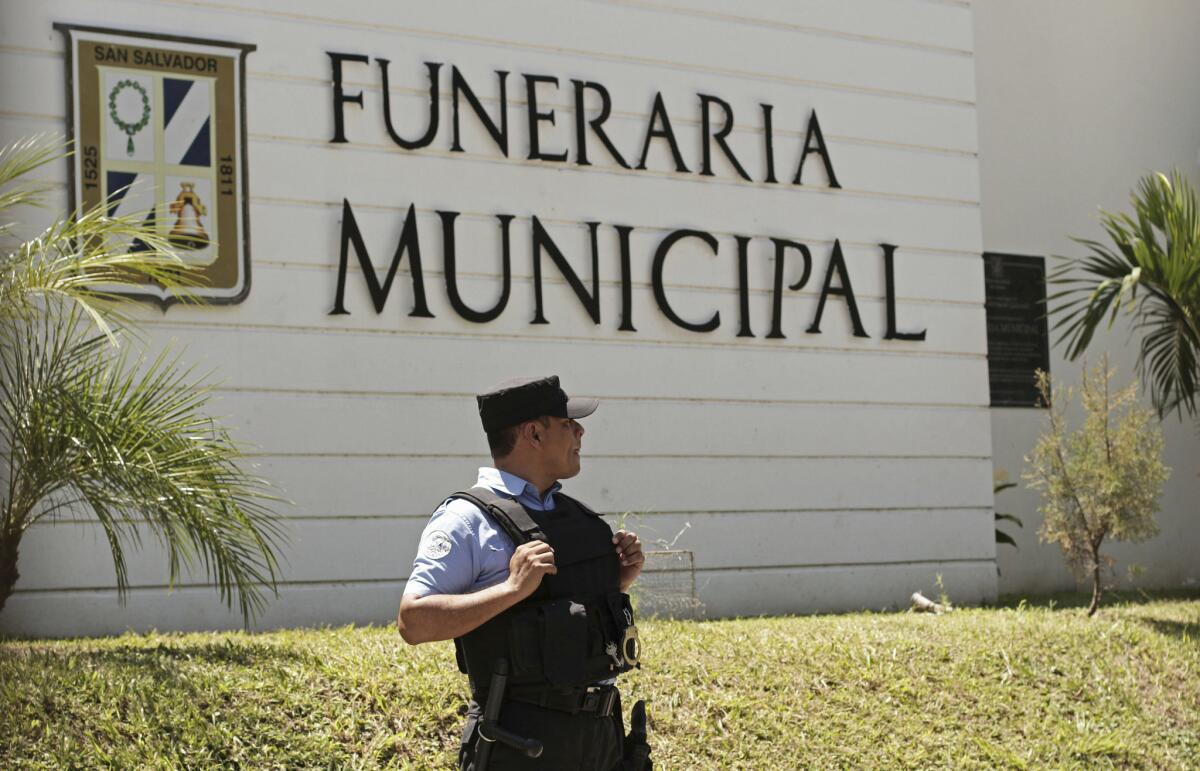Drowned father and daughter mourned at El Salvador cemetery

Reporting from San Salvador — Their drowning deaths provoked worldwide sympathy and outrage, while putting a human face on the issue of global migration.
A photograph of the bodies of a father and daughter huddled face down in a final embrace along the muddy banks on the Mexican side of the Rio Grande spread rapidly via social media and otherwise a week ago, graphically illustrating the dangers faced by migrants.
It drew the attention of leaders such as Pope Francis, who was “profoundly grieved” about the deaths of the U.S.-bound migrants from El Salvador, the Vatican said, and prayed “for them and for all the migrants who have lost their lives trying to escape from the war and misery.”
On Monday, Oscar Alberto Martinez Ramirez, 25, and his 23-month-old daughter, Angie Valeria, were laid to rest in San Salvador. Their bodies had been found June 24 near Matamoros, Mexico, across from Brownsville, Texas.
The international press corps that descended on El Salvador’s capital in the aftermath of the deaths was mostly kept far away from the private ceremony at La Bermeja cemetery, a final resting place for many of the city’s poor.
“The tragedy of Oscar and Valeria made visible the problem of migration, the tragedies that occur daily in the intention to emigrate,” Mario Vega, the pastor of the evangelical church where Martinez and his family worshiped, told the media afterward. “And as long as the people in El Salvador don’t have access to basic rights — security, education, healthcare — the people … will continue to emigrate. The situation is desperate.”
Among the estimated 300 mourners, the pastor said, was Tania Vanessa Avalos, 21, the widow of Martinez and the mother of Angie Valeria. The assembled press did not see the widow or the coffins.
The mother had flown back to El Salvador from Mexico on Friday, ahead of the remains of her husband and daughter, which were transported back home overland.
El Salvador, along with neighboring Honduras and Guatemala, constitute the so-called Northern Triangle region of Central America that is the homeland of most migrants arriving recently at the U.S.-Mexico border. High crime, poverty and general government neglect mark the three countries.
The deaths came amid a surge in migrants, mostly from Central America, seeking to enter the United States and apply for asylum. The increase includes a large number of women and children, in contrast to earlier migrant waves of mostly single men arriving at the border.
With the increasing numbers of migrants have come more deaths, both by drowning and dehydration, the latter as migrants wander in the desert amid intense heat. Migrants also face extortion and violence.
Migrants contemplate dangerous crossings despite border deaths and detention conditions »
The Martinez family came from a crime-racked, working-class San Salvador suburb. Martinez worked in a pizza shop, and his wife at a Chinese restaurant before quitting her job to care for the couple’s daughter. They saw little future in El Salvador, relatives and neighbors said.
The family lived in a neighborhood known as Colonia Altavista, in San Martin, a gritty suburb of San Salvador. Gang violence is rampant in the zone, residents said in interviews.
“Oscar was a tranquil person, he minded his own business, a hard worker,” said Lidia, a neighbor and friend who asked to be identified only by her first name because of security concerns in the neighborhood. “Because of the great problems of insecurity in El Salvador, and because here the jobs are not very well paid, he decided to migrate to the U.S.A. to give a better life to his daughter.”
Martinez’s mother, Rosa Ramirez, told reporters last week that she had pleaded with her son to consider the dangers of the trip and “not to pursue the American dream” — a term that is not without irony, even foreboding, as the perils of the journey have captured headlines. But he and his wife decided to go anyway.
The father and daughter were buried in a single plot in an area of the cemetery named after Oscar Romero, the Salvadoran bishop who spoke on behalf of the poor and was assassinated in the 1980, as the country’s civil war raged. The Vatican canonized Romero as a saint last year.
But the end of the country’s civil war — and the termination of the internal conflict in neighboring Guatemala —did not alleviate intense poverty and high levels of crime, factors that prompt many to embark on the trek for the United States.
Salvadoran President Nayib Bukele pointed to a failure by El Salvador to provide for its people as a contributing factor in the tragedy of father and daughter. The president noted the lack of jobs, schools and healthcare in his nation.
“We can speak blame to any other country, but what about our blame?” Bukele, who took office last month, said Sunday in a news conference. “I mean, what country did they flee? Did they [flee] the United States? They fled El Salvador. They fled our country. It is our fault.”
While both the United States and Mexico have moved to clamp down on illicit migration, many experts say a major downturn is unlikely as long as the so-called push factors — poverty and violence — persist, prompting people to seek opportunities in the north.
“This was about a Salvadoran family trying to find a dignified and secure life in another country,” said Celia Medrano, an expert in immigration. That’s “because in their own country they didn’t find conditions to live with security,” she said.
Special correspondent Renderos reported from San Salvador and Times staff writer McDonnell from Guatemala City.
More to Read
Sign up for Essential California
The most important California stories and recommendations in your inbox every morning.
You may occasionally receive promotional content from the Los Angeles Times.










